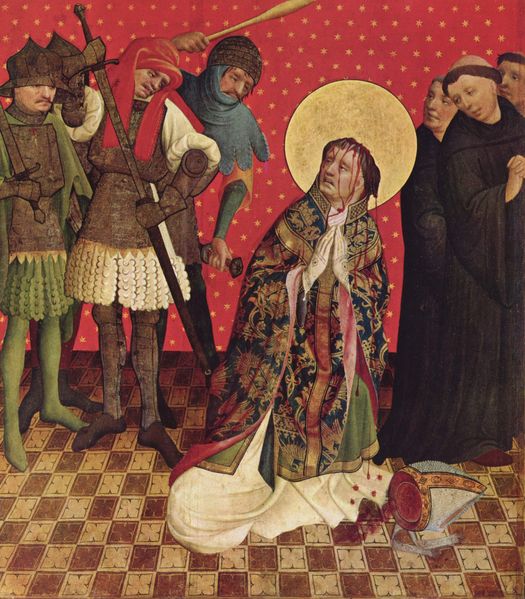
Master Francke’s Martyrdom of St. Thomas Becket, c. 1424
On this date in 1179 Thomas Becket was murdered (born 1118).
Frye on T.S. Eliot’s Murder in the Cathedral:
In Murder in the Cathedral the dialectical and purgatorial aspect of the Christian “comic” action is at its clearest. The foreground action is a tragedy in which the hero knows that “. . . all things / Proceed to a joyful communion.” Of the four worlds [heaven, upper level of nature, lower level of nature, hell], there is no place for the rose garden: we begin in experience, represented by the chorus. The chorus becomes increasingly aware that experience is the doorway to hell, and as the murderers move closer the women of Canterbury are haunted by images of beasts of prey, filth, and corruption, ending in the cry: “The Lords of Hell are here.” Meanwhile Beckett is immediately involved in a sequence of temptations. The chorus describes him as “unaffrayed among the shades,” he he says himself, in language realling the Purgatory line “Treating shadows as a solid thing”: “. . . the substance of our first act / Will be shadows, and the strife with shadows.”
The first tempter, “Leave-well-alone,” presents a temptation that Becket has gone too far to yield to even if he were capable of it. Its object however is not to persude him to desert, but merely to remain in his mind as a source of distraction, confusing him in crucial moments: “Voices under sleep, waking a dead world, / So that the mind may not be whole in the present.” Temptations of compromise and of intrigue follow, but the dangerous temptation is an unexpected fourth one to “do the right deed for the wrong reason”: to preserve in integrity and die a glorious martyr’s death. This temptation is really an act of grace, something that Beckett would never even have encountered by himself, much less overcome. The fact that the fourth tempter, as he leaves, repeats, word for word, Becket’s opening speech in the play, indicates that Becket at this point has “assumed a double part,” separating his real immortal self from the unpurified part of himself. Both this theme and the theme of something apparently demonic turning out to be an agent of grace are frequent in other plays. (CW 29, 243-4)
